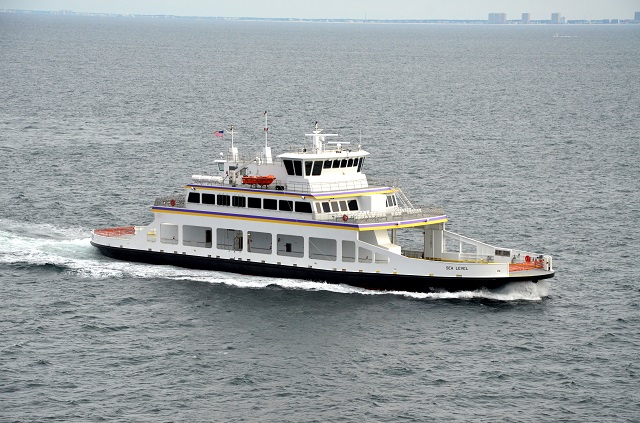MTU Series 4000 Marine Engines Offer Quiet Seas Ahead

MTU, the world’s-leading manufacturer of diesel engines and propulsion systems for ships and heavy land, rail, and defense vehicles, won a competitive bid to power two new ferries introduced into the North Carolina Department of Transportation’s (NCDOT) fleet. MTU’s 8V Series 4000 M60 marine propulsion engines offer ferry riders off the coast of North Carolina a faster, quieter and more fuel-efficient ride. The upgrade has increased control and maneuverability for ferry operators and boosted power in choppy waters—all while reducing fuel burn and wear and tear to the engines.
“Being selected by the second largest state-owned ferry system in the United States to power two of their newest and most esteemed vessels is thrilling,” said Jeff Sherman, marine sales manager, MTU.
The NCDOT operates its fleet of 32 vessels in the Outer Banks, a 200-mile stretch of barrier islands off the coast of North Carolina, where short choppy winds create demanding conditions for the ferries. To withstand the daily rigor of operating more than 200 sailings across five bodies of water, and the transport of more than 1.1 million vehicles and 2.5 million passengers annually, NCDOT’s newest vessels required maximum power, performance and comfort without compromised efficiency. MTU’s cutting-edge diesel engines were selected thanks to their reliability, competitive price point and low life-cycle costs.
Faster, Larger and More Efficient
The two new ferries—Sea Level and Swan Quarter—are 43 percent larger than the retired ferries they replaced and can each carry 300 passengers and 50 cars, or four tour buses, at a time. Although the 1,000 ton vessels are larger than the counterparts they replaced, MTU’s efficient marine propulsion system allows the vessels to burn the same amount of fuel thanks to their ability to conserve power.

“The second turbo only kicks in when the vessels are approaching 12 knots,” said Joe Waldrep, marine design engineer for the NCDOT ferry project.
With 700-800 horsepower at 1400 RPM, the turbocharged engines are designed to run at speeds faster than 14 knots. Once the vessels approach 12 knots, operators are able to release off the throttle and continue the trip at one turbo. This increase in power capacity allows the vessels to run at 60 percent of their maximum power, which saves fuel and decreases engine wear and tear.
The turbocharged engines offer ferry operators more power and control, giving them more confidence maneuvering in close quarters. While the power conservation offers a win for passengers who now experience fewer delays. By operating at a fraction of their power, the ferries are able to catch up to schedule or navigate through extreme weather by utilizing the vessels’ reserve power. “We could leave five to 20 minutes late and still get passengers there on time,” said Waldrep.
Quiet Seas Ahead
Engine noise is undetectable aboard Sea Level and Swan Quarter in the passenger lounge—a noticeable difference for long-time commuters.
MTU is not singularly committed to developing world-class diesel engine. The manufacturer takes great care to evaluate the conditions and environments in which their engines will operate to customize installation solutions to meet every need. For the two new NCDOT vessels, MTU placed its engines on rubber mounts—a practice, known as “soft mounting.” This eliminates noise, allowing passengers to enjoy the crashing sound of water as they stroll around the open decks or sit in the lounge.
“It’s a really smooth ride. That’s one thing everyone’s noticing. You don’t hear the boat. In other boats you shake rattle and roll,” said Waldrep.
MTU Series 4000 M60 in detail
Designed for workboats, ferries, tugs, barges and large sailing yachts, the MTU Series 4000 M60 engine has earned a strong reputation by pairing power and endurance, all while providing maximum fuel efficiency. Offered in 8-, 12- and 16-cylinder configurations, the Series 4000 M60 offers unsurpassed power density in terms of volume-to-power ratio and power-to-weight ratio combined with effortless unfolding of power and bottom end torque due to MTU’s unique turbocharging technology.
The products and services herein described in this press release are not endorsed by The Maritime Executive.
